Rita-新概念英语教案 第二册 8
初中英语教案新概念2 lesson 8(教师版)-张淑芬(001)
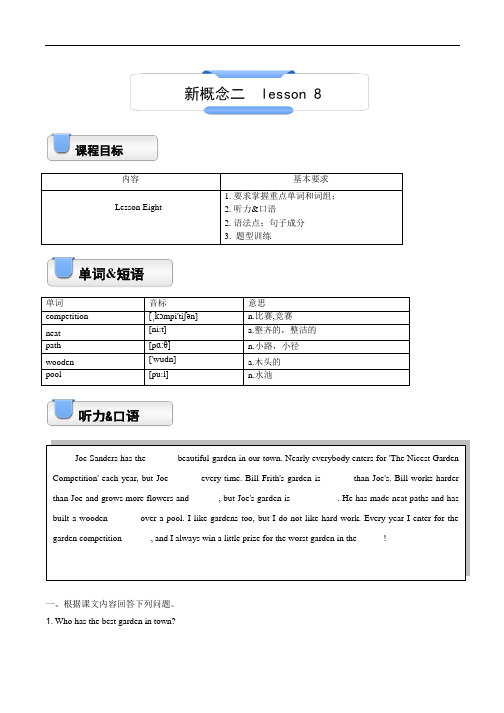
新概念二 lesson 8 课程目标单词&短语听力&口语一、根据课文内容回答下列问题。
1. Who has the best garden in town?2. What does he win each year?________________________________________________________________________________3. Who else has a fine garden?________________________________________________________________________________4. Is Joe’s garden better or not?________________________________________________________________________________5. Is the writer’s garden beautiful or terrible?________________________________________________________________________________6. What does he always win a prize for?________________________________________________________________________________二、根据答案,对本文章进行口头转述。
____________________________________________________________________________________________ ____________________________________________________________________________________________ ____________________________________________________________________________________________ ____________________________________________________________________________________________ ____________________________________________________________________________________________ ____________________________________________________________________________________________ ____________________________________________________________________________________________ ____________________________________________________________________________________________The best and the worst1. enter for 他报名参加了一个英语比赛____________________________________________________________________________ 【注意】enter 和enter for 的区别Everybody stood up when he entered the room. Did you enter for this examination?The lights went out just as we entered the cinema. How many people have entered for the race?观察上面的区别,进行总结:enter______________________________________ enter for ___________________________________ Exercise 1 必要时填上for。
新概念英语第二册-Lesson-8讲课教案

while others were waiting on the airfield. 5.To their surprise, he was not having a class at that time.
2020/4/26
Do you often go for some competitions (race, match比赛, 竞赛), like drawing, sports, or chess competitions?
Lesson 8
The best and the worst
The plane was late and ______d_e_t_e_ct_iwveesre waiting at the _________a_ir_paollrtmorning . They were expecting a _________ _________of_ __va_l_u_a_b_l_efrpoamrcSeol uth Africad.iaAmfeowndhsours earlier , someone had told the police that ___________would try to __th__ie_v_e_s___the diamonds . When thestpealalne arrived , some of the detectives were waiting inside the main building while others were waiting on the airfield.
《新概念英语》第二册第8课
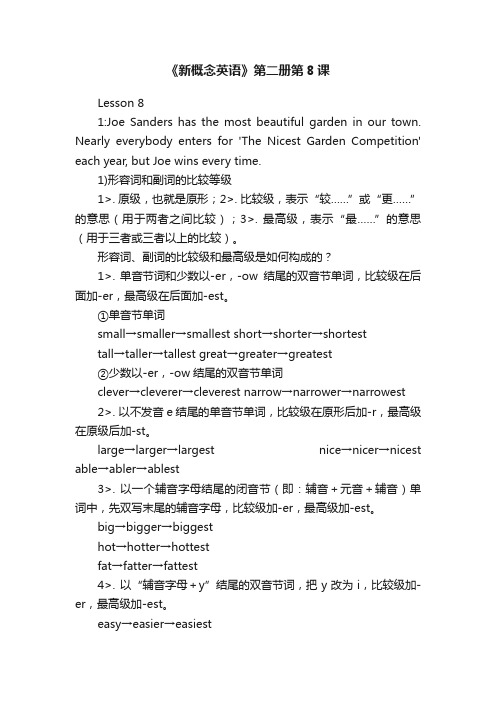
《新概念英语》第二册第8课Lesson 81:Joe Sanders has the most beautiful garden in our town. Nearly everybody enters for 'The Nicest Garden Competition' each year, but Joe wins every time.1)形容词和副词的比较等级1>. 原级,也就是原形;2>. 比较级,表示“较……”或“更……”的意思(用于两者之间比较);3>. 最高级,表示“最……”的意思(用于三者或三者以上的比较)。
形容词、副词的比较级和最高级是如何构成的?1>. 单音节词和少数以-er,-ow结尾的双音节单词,比较级在后面加-er,最高级在后面加-est。
①单音节单词small→smaller→smallest short→shorter→shortesttall→taller→tallest great→greater→g reatest②少数以-er,-ow结尾的双音节单词clever→cleverer→cleverest narrow→narrower→narrowest2>. 以不发音e结尾的单音节单词,比较级在原形后加-r,最高级在原级后加-st。
large→larger→largest nice→nicer→nicest able→abler→ablest3>. 以一个辅音字母结尾的闭音节(即:辅音+元音+辅音)单词中,先双写末尾的辅音字母,比较级加-er,最高级加-est。
big→bigger→bigg esthot→hotter→hottestfat→fatter→fattest4>. 以“辅音字母+y”结尾的双音节词,把y改为i,比较级加-er,最高级加-est。
easy→easier→easiestheavy→heavier→heaviestbusy→busier→busiesthappy→happier→happiest5>. 其他双音节词和多音节词,比较级在前面加more,最高级在前面加most。
新概念第二册第8课教案
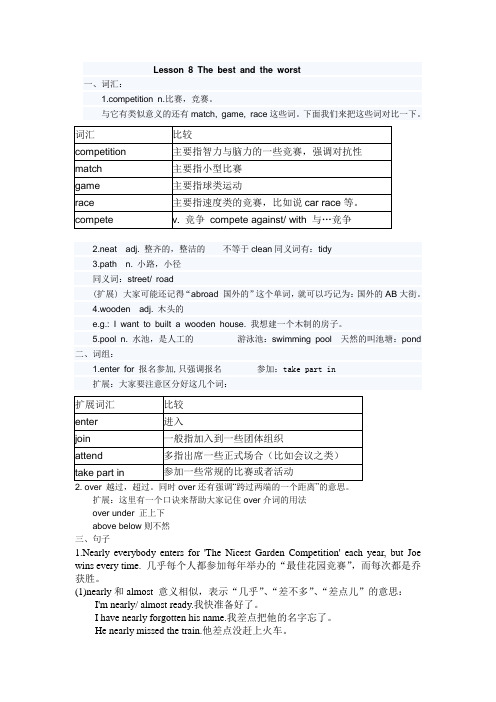
Lesson 8 The best and the worst一、词汇:petition n.比赛,竞赛。
与它有类似意义的还有match, game, race这些词。
下面我们来把这些词对比一下。
2.neat adj. 整齐的,整洁的不等于clean同义词有:tidy3.path n. 小路,小径同义词:street/ road(扩展) 大家可能还记得“abroad国外的”这个单词,就可以巧记为:国外的AB大街。
4.wooden adj. 木头的e.g.: I want to built a wooden house. 我想建一个木制的房子。
5.pool n. 水池,是人工的游泳池:swimming pool天然的叫池塘:pond二、词组:1.enter for 报名参加,只强调报名参加:take part in扩展:大家要注意区分好这几个词:2. over越过,超过。
同时over还有强调“跨过两端的一个距离”的意思。
扩展:这里有一个口诀来帮助大家记住over介词的用法over under正上下above below则不然三、句子1.Nearly everybody enters for 'The Nicest Garden Competition' each year, but Joe wins every time. 几乎每个人都参加每年举办的“最佳花园竞赛”,而每次都是乔获胜。
(1)nearly和almost 意义相似,表示“几乎”、“差不多”、“差点儿”的意思:I'm nearly/ almost ready.我快准备好了。
I have nearly forgotten his name.我差点把他的名字忘了。
He nearly missed the train.他差点没赶上火车。
(2)each和every均可译为“每一个”,二者常常可以互相代替使用:Every/ Each time I wash the car it rains.每次我擦洗汽车,天总是下雨。
新概念第二册lesson8教案

NEW CONCEPT ENGLISH SB2Lesson 8 Do you speak English? (NCE lesson 14)Teaching goals:1. Target languagea. Learn the following words and phrases:amusing experience leave village next town south drive wave ask sb. for a lift French reply same language apart from word not…at all neither s peak during journey nearly reach suddenly slowly soon himselfb. Learn some important sentences:①. I had an amusing experience last year.②. Neither of us spoke during the journey.③. After I had left a small village in the south of France, I drove on to the next town.2. Ability goalDevelop the students’ abilities to listen, s peak, read and write in English.3. Learning ability goalMake the students know about the writer’s an amusing experience.Teaching Important Points:1.How to improve the students’ reading ability.2.How to write a summary.Teaching Difficult Points:1. Help the students master some useful words and expressions.2. Help the students understand the text.3. Enable the students to use the sentence patterns correctly.Teaching Methods:1.Asking-and-answering activity to go through the text.2.Discussion before and after reading to make the students interested in what they will read and further understand what they have read.3.Careful-reading to get the detailed information in the text.4.Individual, pair or group work to make every student work in class.5. Listening and repeating method to improve the students’ pronunciation.Teaching Aids:1. a tape recorder2. multimediaTeaching Procedures:Step1. Greetings and RevisionCheck the homework.Step2. Lead-in1.Free talk with the students: Have you ever tried to talk to someone who didn’tknow your language? What happened?2.T: Now, please look at the pictures on the screen and answer the question: what doyou think is happening in the picture?(Individual work)T: Today we’re going to learn lesson 8 “Do you speak English?”.It is about a man who had an amusing experience last year .Step3. ListeningT: Now let’s listen to the tape. First we’ll learn some new words on the blackboard. (Write the new words on the blackboard.)Let the students listen to the tape twice and find the answers to the questions.Q1: Do they talk to each other?→No, they don’t.(Check the answers with the whole class after the students listen to the tape.)Step4. Reading1. Let the students read the text and have a discussion with the partners.(Pair work and Individual work)These questions are on the text. Write a complete sentence in answer to each question. Q1. What happen when the writer was driving to a town in French?→.A young man waved to the writer and asked for a lift.Q2. In which language did the young man reply to the writer’s greeting?→He replied in French.Q3. Does the writer speak any French or not?Q4. Why did neither of the speak during the journey?→. Because both of them thought the other was French and both of them knew little French.Q5.What did the young man say at the end of the journey?→He said very slowly: “Do you speak English?”.(Teacher goes among the students and collects the difficult points that the students can’t understand after having a discussion.)2. Deal with some language points. (on the screen)1)On the way; 在路上,在途中2)Wave to sb; 冲某人挥手3)ask sb for sth; 请求某人要求得到什么东西4) As soon as; 一….就。
新概念英语第2册课程讲义Lesson8
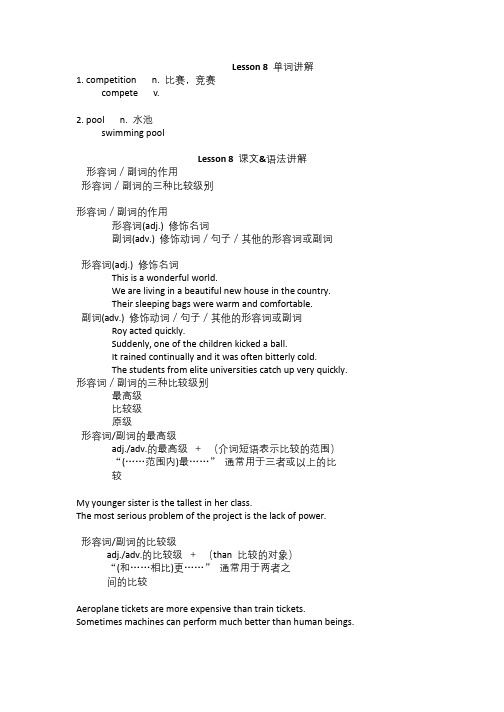
Lesson8单词讲解petition n.比赛,竞赛compete v.2.pool n.水池swimming poolLesson8课文&语法讲解形容词/副词的作用形容词/副词的三种比较级别形容词/副词的作用形容词(adj.)修饰名词副词(adv.)修饰动词/句子/其他的形容词或副词形容词(adj.)修饰名词This is a wonderful world.We are living in a beautiful new house in the country.Their sleeping bags were warm and comfortable.副词(adv.)修饰动词/句子/其他的形容词或副词Roy acted quickly.Suddenly,one of the children kicked a ball.It rained continually and it was often bitterly cold.The students from elite universities catch up very quickly.形容词/副词的三种比较级别最高级比较级原级形容词/副词的最高级adj./adv.的最高级+(介词短语表示比较的范围)“(……范围内)最……” 通常用于三者或以上的比较My younger sister is the tallest in her class.The most serious problem of the project is the lack of power.形容词/副词的比较级adj./adv.的比较级+(than比较的对象)“(和……相比)更……” 通常用于两者之间的比较Aeroplane tickets are more expensive than train tickets. Sometimes machines can perform much better than human beings.1.Joe Sanders has the most beautiful garden in our town.2.Nearly everybody enters for'The Nicest Garden Competition'each year,but Joe wins every time.3.Bill Frith's garden is larger than Joe's.Bill Frith's garden is larger than Joe's garden.Bill Frith's garden is larger than Joe.X4.Bill works harder than Joe and grows more flowers and vegetables,but Joe's garden is more interesting.5.Every year I enter for the garden competition too,and I always win a little prize for the worst garden in the town!Lesson8知识拓展本课重点:形容词/副词形容词副词的比较级/最高级形容词副词的比较级I am fatter than before.I am fatter than I was.I am fatter than I used to be.形容词副词的比较级The traffic block is more serious than before.The traffic block is more serious than it was.The traffic block is more serious than it used to be.形容词副词的比较级You are smarter than they think.The project took longer than I expected.形容词副词的比较级Bill’s garden is larger than Joe.Bill’s garden is larger than Joe’s.形容词副词的比较级The population of Beijing is larger than Tianjin.The population of Beijing is larger than that of Tianjin.形容词副词的比较级The visitors to London is more than Bath.The visitors to London is more than those to Bath.。
【教育资料】新概念英语二册 lesson8 教师版讲义学习专用
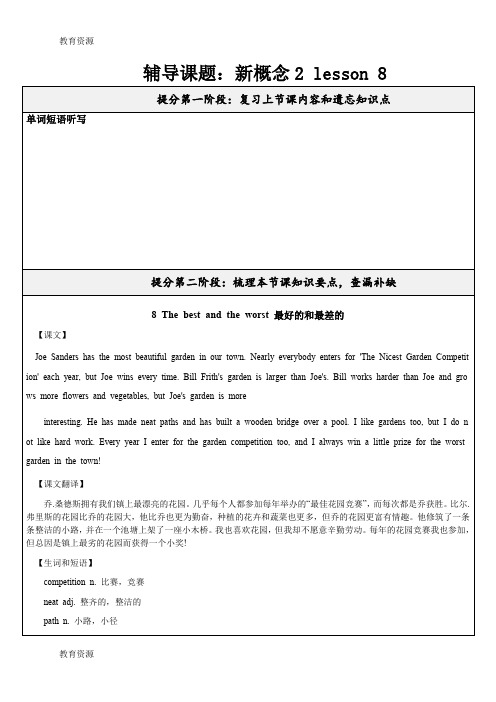
辅导课题:新概念2 lesson 8提分第一阶段:复习上节课内容和遗忘知识点单词短语听写提分第二阶段:梳理本节课知识要点,查漏补缺8 The best and the worst 最好的和最差的【课文】Joe Sanders has the most beautiful garden in our town. Nearly everybody enters for 'The Nicest Garden Competition' each year, but Joe wins every time. Bill Frith's garden is larger than Joe's. Bill works harder than Joe and gro ws more flowers and vegetables, but Joe's garden is moreinteresting. He has made neat paths and has built a wooden bridge over a pool. I like gardens too, but I do not like hard work. Every year I enter for the garden competition too, and I always win a little prize for the worst garden in the town!【课文翻译】乔.桑德斯拥有我们镇上最漂亮的花园。
几乎每个人都参加每年举办的“最佳花园竞赛”,而每次都是乔获胜。
比尔.弗里斯的花园比乔的花园大,他比乔也更为勤奋,种植的花卉和蔬菜也更多,但乔的花园更富有情趣。
他修筑了一条条整洁的小路,并在一个池塘上架了一座小木桥。
我也喜欢花园,但我却不愿意辛勤劳动。
每年的花园竞赛我也参加,但总因是镇上最劣的花园而获得一个小奖!【生词和短语】competition n. 比赛,竞赛neat adj. 整齐的,整洁的path n. 小路,小径wooden adj. 木头的pool n. 水池提分第三阶段:考试考点例题讲解,掌握解题思路★competition n. 比赛,竞赛(暗地里的竞争)race n. 比赛,竞赛car racematch n. 比赛football matchcontest n. 比赛(更广泛)baby contest 宝宝大赛;beauty contest 选美game : 游戏, 运动★neat adj. 整齐的, 整洁的,井井有条clean adj. 干净的neat=tidy <adj.>tidy <v.> (up) the room 整理房间★pool n. 水池(人工的)swimming pool 游泳池pond 池塘(天然的)《golden pond》—金色池塘提分第四阶段:拓展延伸,思路方法总结,纵横考场【课文讲解】1、Joe Sanders has the most beautiful garden in our town.Joe's garden is the most beautiful.Bill's garden is the largest.Bill’s garden is larger than Joe’s.(比较的东西都是同类的事物joe’s 的“’s”不能省略)2、Nearly everybody enters for 'The Nicest Garden Competition' each year, but Joe wins every time.nearly和almost意义相似,表示“几乎”、“差不多”、“差点儿”的意思。
新概念第二册Lesson_8_The_best_and_the_worst

compete [kəm'pi:t] vi. 竞争;比赛;对抗
compete against sb.. compete with sb.
race n. 比赛 (速度)
horse race
Marathon race
match n. (球类)
game n. (泛指)
the Olympic Games
1、Joe Sanders has the most beautiful garden in our town. Joe's garden is the most beautiful. eg.:Bill's garden is the largest. Bill’s garden is larger than Joe’s. (比较的东西都是同类的事物joe’s 的“’s”不能省 略) 2、Nearly everybody enters for 'The Nicest Garden Competition' each year, but Joe wins every time. nearly和almost 意义相似,表示“几乎”、“差 不多”、“差点儿”的意思。 I have nearly forgotten his name. 我差点把他的名 字忘了。 I’m nearly/almost ready. 我快准备好了。
a neat room clean/tidy
neat [ni:t] 不参水的;纯的
a neat whisky
neat: 整洁的, 整齐的(适合用 于赞赏女孩子的房间) e.g. What a neat room! What a mess ! e.g. a neat cupboard/ room/ house/ e.g. she is a neat dresser/ worker. e.g. a neat whisky/ Brandy/ vodka/
- 1、下载文档前请自行甄别文档内容的完整性,平台不提供额外的编辑、内容补充、找答案等附加服务。
- 2、"仅部分预览"的文档,不可在线预览部分如存在完整性等问题,可反馈申请退款(可完整预览的文档不适用该条件!)。
- 3、如文档侵犯您的权益,请联系客服反馈,我们会尽快为您处理(人工客服工作时间:9:00-18:30)。
2010-05-01/02 初三、初四【前10分钟】检查笔记、检查作业、背诵课文、听写单词。
10’Lesson 8 - The best and the worst一、教学重点1、词汇:形容词和副词的比较级和最高级。
2、词汇:跟every相关的复合不定代词。
二、教学步骤【第一节课】Array1、引入话题(详见右框)。
2’2、听一遍音频,掌握大意。
3’①How is Joe’s garden?②Who else has a fine garden?③What prize does the writer always win?3、生词解读,纠正发音。
5’4、提问:Why is Joe’s garden the most beautiful one in the town?看一遍视频,解答问题。
3’5、精讲课文,板书和笔记(详见下文)。
20’6、再听一遍音频,逐句跟读。
2’7、学生自己大声朗读。
5’【第二节课】1、做43页的两道选择理解题。
5’2、朗读课文。
10’3、找出课文中的比较级和最高级。
5’4、详细讲解形容词和副词的比较级和最高级(详见下文)。
10’5、做41页的练习。
15’6、听一首英文歌曲。
5’【第三节课】1、跟every相关的复合不定代词。
5’2、做42页的练习。
10’3、听写单词,记忆法指点。
5’4、读绕口令游戏。
8’5、看图背课文比赛。
20’6、总结本课重点,让学生标注(详见上文)。
1’7、布置作业:摘要写作,43页的选择题,背课文和单词。
1’三、精讲课文1、Joe Sanders has the most beautiful garden in our town.beautiful-more beautiful-the most beautiful;【多音节词】【the + 形容词的最高级】2、Nearly everybody enters for 'The Nicest Garden Competition' each year, but Joe wins every time.nice-nicer-the nicest;【单音节词】【the + 形容词的最高级】nearly = almost 几乎。
everybody 看作三单。
each = every 每一个。
every time 每次。
enter for 报名参加。
例句:He entered for marathon last year. She’ll enter for a beauty contest.3、Bill Frith's garden is larger than Joe's (garden).large-larger-the largest;【单音节词】【形容词的比较级+ than】4、Bill works harder than Joe and grows more flowers and vegetables, but Joe's garden is more interesting.hard-harder-hardest;【单音节词】【副词的比较级+ than】many-more-the most;【不规则变化】【形容词的比较级】interesting-more interesting-the most interesting;【多音节词】【形容词的比较级】grow 种植,培育(及物动词)。
例:grow plants,grow ricegrow 生长,成长(不及物动词)。
例:The flowers grow well. He has grown up.5、He has made neat paths and has built a wooden bridge over a pool.neat = tidy VS clean ;path VS road ;wooden VS golden ;pool VS Liverpoolover 在…上面,横跨…(above and across from one side to the other)例句:He jumped over the river. The bird flew over the field.6、I like gardens too, but I do not like hard work.这里的hard是个形容词。
work是不可数名词。
hard work [n.] VS work hard [v.] VS hard-working [adj.]7、Every year I enter for the garden competition too, and I always win a little prize for the worst garden in the town!win + 比赛/奖品:win the game,win a prize (for...)beat/defeat + 对手:I beat you. The Rocket defeated the Lakers.bad-worse-the worst;【不规则变化】【形容词的最高级】little 小的,微不足道的。
例句:a little present四、总结与练习1、文化背景:在英美许多国家,花园是居住品质的重要部分,前花园(front garden),后花园(back garden)。
很多西方人都很喜欢园艺(the art of gardening),在花园里喝下午茶(afternoon tea),或者开个派对(have a garden party)。
2、形容词和副词的比较级和最高级:★概念:比较级用于两者作比较;最高级用于三者或三者以上作比较(通常有范围of/in)。
★变化规则:(1)规则变化:形容词和副词的变化规则相似,只是形容词最高级前一般加the而副词不用。
①一般情况+er/est:hard-harder-hardest,nice-nicer-nicest②以一个辅音字母结尾的重读闭音节,双写该辅音字母+er/est:big-bigger-biggest③以辅音字母+y结尾的,y→i+er/est:lazy-lazier-laziest,heavy-heavier-heaviest④多音节及某些双音节词,+more/most:difficult-more difficult-most difficult,tired-more tired-most tired(2)不规则变化:(好坏、多少、远老)good/well-better-best,bad/ill/badly-worse-worst,many/much-more-most,few/little-less-least far-farther/further-farthest/furthest,old-older/elder-oldest/eldest★固定句型:(1)形容词①原级:He is as tall as me.He is not as/so tall as me.②比较级:He is taller than me.He is the taller of the two boys.Our country is getting stronger and stronger.The more, the better.The more difficult the problem is, the more careful we should be.③最高级:He is the tallest of the three boys. = He is taller than the other two boys.He is one of the tallest boys in our class.The Y ellow River is the second longest river in China.(2)副词①原级:Tom runs as fast as Jack.Tom doesn’t run as/so fast as Jack.They ran away as fast as possible.②比较级:Tom runs faster than Jack.Tom runs faster and faster.The harder you work, the better you will learn.③最高级:Tom runs fastest in the team.He talks (the) least and does (the) most in his class.※更多例句:①He has read more books than I do.②This is a much nicer hotel than that one.③Of all the school subjects I like English the best.④This is the funniest joke I’ve ever heard.⑤This restaurant is less expensive than that one.3。
